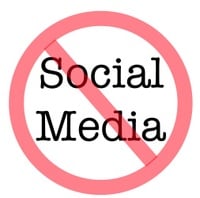I've had an opportunity to casually explore the attitudes of hundreds of large and small companies whose employees attend my full-day New Rules of Marketing seminar and my keynote speeches. In my very unscientific questioning, my guess is that about 25% of companies block employee access to YouTube, Facebook, and other social networking sites.
Twenty-five percent block access!
That is a huge number of companies that are putting their organizations at a disadvantage.
I can't tell you the names of the nanny-state dinosaurs. But you'd be amazed at some of the big names that are too scared to let people into the world of social media.
One company I can talk about is on the other side. IBM is on the forefront of embracing employee use of social media (more on IBM later in this post).

If I managed a hedge fund, I'd sell short a basket of stocks of companies that block Social Media like YouTube and Facebook and buy stock in the companies (like IBM) that encourage employee use of these new tools. (Seen IBMs stock chart recently?)
Here are some reasons given by people for their companies blocking access to sites like YouTube, Facebook, and other similar sites:
- It is a drain to productivity
- It is a security issue within the company computer systems
- People may harm the company brand should employees reveal too much information
- It is a bandwidth issue
Do you trust your employees?
I think the big thing here is trust. The reasons cited above are just an excuse. If you trust your employees, they might surprise you. But if you don't trust them, over time you end up with only the corporate dregs who don't mind working in an organization that won't let them communicate with others in the ways that people are using today, like Facebook, YouTube and the like.
Ultimately, I think the HR and legal people are naive and scared and since they don't understand social media, they just slap on controls.
My friend Dianna Huff recently conducted a survey How Workers Access YouTube. She learned that two-thirds of people in companies watch YouTube videos while at work. Of those, about 40% watch YouTube videos for both business and personal reasons. However, more than 80% of people watch YouTube videos at home (sometimes that is the only way because they are blocked at work). I've had people tell me that when they find a work-related video, they need to email the link home and watch it there. Read Dianna's blog post and download her research How Workers Access YouTube for details.
Do you allow employees to have email at work?
It's been fascinating to both observe and participate in the debate about social media in the enterprise. Just like the hand-wringing over personal computers entering the workplace in the 1980s, and also echoing the Web and email debates of the 1990s, company executives seem to be getting their collective knickers in a twist about social media now. Remember when executives believed email might expose a corporation to its secrets being revealed to the outside world? Do you remember when only "important employees" were given computers and email addresses? How about when people worried about employees freely using the public Internet and all of its (gasp!) "unverified information"?
It seems silly now to forbid employees to have access to email. Yet is the exact same debate and using exactly the same language as a decade ago.
On one side of the corporate fence, the HR geniuses and the legal eagles are worried about secrets being revealed and time being wasted by their employees while using social media, creating content or commenting on social media sites. Corporate nannies want to make certain that their naive charges don’t get into trouble in the big scary world of information.
Well, duh; we're talking about people here. Employees do silly things. This debate should be centered on people, not technology.
My recommendation to organizations is simple. Have guidelines about what you can and cannot do at work, but don't try to make a specific set of social media guidelines. I'd suggest implementing corporate policies that say (for example) that employees can't sexually harass anyone, that they can't reveal secrets, they can't use inside information to trade stock or influence prices, and they shouldn't talk ill of the competition in any way or via any media. The guidelines should include email, using social media, commenting on online forums and chat rooms, and other forms of communication. Rather than focus on putting guidelines on social media (the technology), it is better to focus on guiding the way people behave.
IBM Social Computing Guidelines
IBM has developed a set of social media guidelines for employee us of blogs, wikis, social networks, virtual worlds and social media that I think are just fantastic.
From the guidelines: "Whether or not an IBMer chooses to create or participate in a blog, wiki, online social network or any other form of online publishing or discussion is his or her own decision. However, emerging online collaboration platforms are fundamentally changing the way IBMers work and engage with each other, clients and partners." GREAT. This is the way of the future. Hat tip to IBM.
My advice for bosses is to follow the IBM example.
Do you work for a company that blocks access?
If you're an employee who works for a company that blocks access, I suggest you send them this blog post and encourage them to read my other posts and my book The New Rules of Marketing & PR.
If they still refuse to open up, I suggest you quit your job and work for a company that embraces the new world. You'll need to find a new job at some point anyway, because your company won't be around in a few years as the smarter competitors take away your business by reaching buyers using social media.